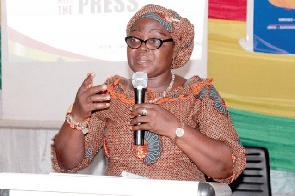The government’s Green Ghana Project (GGP) remains a realistic intervention to mitigate the effects of climate change in the country, Justina Owusu-Banahene, the Bono Regional Minister has said. The project, she said, had for the past two years planted more than 27 million varieties of tree species to restore the nation’s degraded forest and vegetative cover. Madam Owusu-Banahene, therefore, implored everybody to help nurture and grow the trees to help tackle the nation’s vulnerability to climate change and its impacts. The Regional Minister was speaking at a climate justice promotion capacity building and knowledge sharing workshop in Sunyani, organised by the Sunyani Zonal Chapter of the Ghana Institute of Planners (GIP) with support from the G2 Foundation, a non-government organisation. Under the theme “Climate Change, Iniquities and Building a Local Resilience: Promoting Climate Justice through Planning Activism", the workshop was attended by development planners drawn from the 12 politically administrative districts and municipalities in the Bono Region. It sought to empower participants including traditional leaders and students to adapt climate mitigation systems and strategies, as well as helping to put climate issues on the forefront of policy formulation and implementation at district and regional levels. Mad Owusu-Banahene emphasised the government’s commitment towards implementing policies and programmes directed at mitigating the effects of climate change in the country. The government has committed the Forestry Commission (FC) to ensure six million tonnes of greenhouse gas emissions reduction under the Ghana Cocoa Forest REDD+ programme with the World Bank since 2019, she added. She, therefore, stressed the need to strengthen the competencies of development practitioners for effective and efficient formulation and implementation of programmes aimed at achieving climate justice set targets. “Agriculture, water, energy and the extraction of mineral resources are essential drivers of development in our countries, but at the same time, are characteristically sensitive to changing climate,” Mad Owusu-Banahene indicated. Dr. Michael Addaney, lecturer at the University of Energy and Natural Resources, observed that climate change was well felt in the country, and called for concerted efforts to tackle unscrupulous human activities contributing to global warming. Earlier, in a welcoming address, James Ata-Era, the Sunyani Zonal Chairman of the GIP, called on the Municipal and District Assemblies in the region to strengthen by-laws on environmental sustainability. He called on everybody to support the fight against illegal mining, logging, sand winning and the indiscriminate dumping of plastic waste.

















